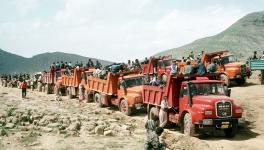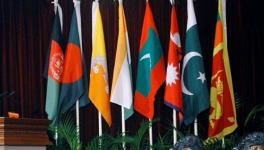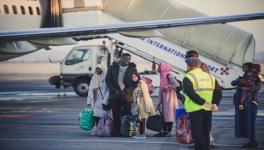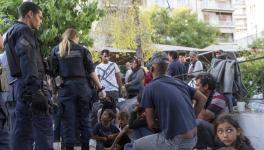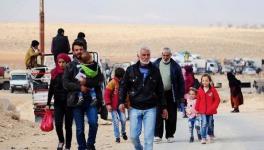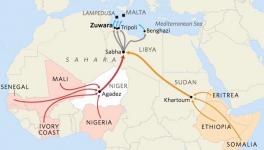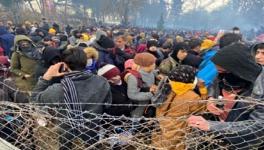Imperialist Occupation and Wars are the Driving Force Behind the Displacement of People
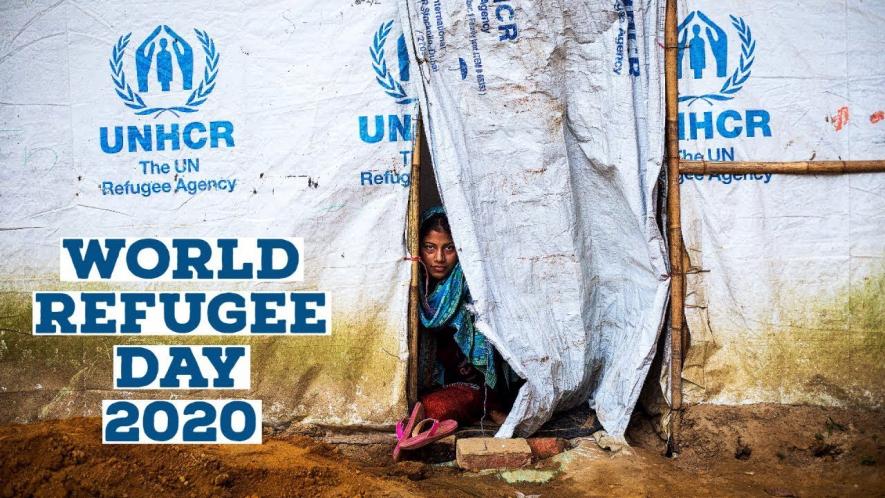
(Photo: UNHCR/Achilleas Zavallis)
In its annual “Global Trends” report released on June 18, Thursday, the United Nations High Commissioner for Refugees (UNHCR) noted that the total number of displaced persons globally rose by a record 9 million in 2019. Though most of them are internally displaced, the number of people forced out of their countries, or international refugees, is also increasing.
The spread of COVID-19 globally has caused renewed concern about the safety and well-being of the world’s refugee population, most of whom are living in unsafe conditions. While health infrastructure in refugee camps, particularly in third world countries, has always been a matter of concern, the pandemic has heightened these worries.
Who is considered a ‘refugee’?
The word ‘refugee’ as a generic term has been used to describe all kinds of displaced people. However, the existing set of international laws on displaced persons – the United Nations Refugee Convention of 1951 and its 1967 protocol – reserve the term for those forced to migrate to other countries due to war, persecution and conflicts.
The international laws related to refugees accord them several rights, including the right to work, housing, education, public relief, freedom of religion, movement and legal remedies. Most crucial among these is the right to non-refoulement, as per which, a refugee cannot be forced to go back to his/her country of origin where she/he is liable to be subjected to persecution.
According to this year’s UNHCR report, there were around 26 million refugees in the world by the end of 2019. Of these, 5.6 million are Palestinian refugees displaced in the 1948 Nakba and during the successive Israeli expansions into Palestinian territory. The Palestinian refugees are placed under a special UN agency – the United Nation’s Refugee Welfare Association for Palestine (UNRWA) – formed in December, 1948.
The rest of the 20 million odd refugees worldwide are kept under the mandate of the UNHCR, which works together with the International Organization of Migration (IOM) and the Red Cross/Red Crescent Movement to provide different kinds of assistance to these refugees.
In addition to formal refugees (identified as citizens of a particular country forced to leave the country for some reasons), there are around 3.9 million stateless people who are denied citizenship rights by their countries.
Among the refugees, there are people who want to go back, but also those who seek asylum in the host or a third country. According to the UNHCR, there were around 3.5 million asylum seekers in 2019, worldwide.
Half of the global refugee population is constituted by children below the age of 18.
Victims of conventional and unconventional imperialist wars
As per the report, the biggest reason for the large-scale displacement of people across the world is war, followed by natural or man-made disasters, climate change, poverty and state persecution, or a mixture of these. However, according to the 1951 convention and its 1967 protocol, only people forced to migrate due to war and conflict or persecution are considered as “refugees”.
Climate change-induced factors, such as destruction of agricultural systems and increasing intensity and frequency of natural disasters, are fast emerging as the other major reasons for the displacement of people. The absence of recognition of disaster victims and economic distress-driven migrants as refugees is one of the key aspects of the problem as people are increasingly forced to cross borders in search of economic opportunities or fleeing natural and man-made disasters. This necessitates rethinking the legal and political conception of who is considered a ‘refugee’.
Unconventional wars waged by the US in Latin and Central American countries, such as promoting warlords and placing economic sanctions, including against Venezuela, along with the exploitative activities of large capitalist corporations, have led to massive climatic and economic problems in these countries.
The rise in the number of refugees from Venezuela in the past two years is directly related to life-threatening economic sanctions imposed by the US and its allies on the country. Due to the economic distress resulting from these sanctions, Venezuelans have become the second largest refugee population in the world.
According to the latest data, Syrians make up the largest refugee population with around seven million Syrian refugees living in countries like Turkey (around four million), Lebanon and other Arab or European countries. They have been forced to flee their country because of war sponsored by the imperialist powers and their lackeys in the region.
According to UNHCR data, more than two-thirds of the non-Palestinian refugees come from only five countries – Syria, Venezuela, Afghanistan, South Sudan and Myanmar.
The destruction of the political, economic and social infrastructure of such countries by imperialist aggression, both conventional and non-conventional, remains the primary reason for the displacement of millions globally. The prolonged wars in most of these countries have also destroyed the chances of return of the refugees, who are forced to live in camps and face various forms of harassment.
The report identifies the most worrying trend as the diminishing prospects for the refugees to return home. It says, “in the 1990s, on average 1.5 million refugees were able to return home each year. Over the past decade that number has fallen to around 385,000.”
Persistent problems
Today, the topmost recipients of refugees are Turkey (3.7 million), Colombia (1.8 million), Pakistan (1.4 million), Uganda (1.2 million) and Sudan (1.1 million). Germany is the largest recipient of refugees among the first world countries, with over 1.1 million refugees. Bangladesh has around 800,000 Rohingya refugees (1.1 million as per government estimates) living in the country since 2017. Rohingyas are the fourth largest refugee population after Syrians, Afghans and South Sudanese. In Africa, 900,000 Somalians have become refugees in different neighboring countries like Kenya and Ethiopia and across the sea in Yemen. Yemen itself is ravaged by a war waged by the Saudis and their regional and international allies, including the US.
According to the UNHCR, 80% of the refugees live in poorer third world countries, where it is difficult to ensure their right as specified by the successive international laws and treaties. A large number of the refugees are forced to live in subhuman conditions in countries such as Bangladesh and Pakistan, among others. This is partly due to insufficient capacities in developing countries, but also resulting from lack of political will. A large number of the developing world countries have also had to dismantle the economic and social rights for their own citizens, owing to the neoliberal economic policies imposed by the developed nations since the late 1970s.
Some of the host countries are also non-signatories to the existing refugee conventions, allowing them to completely shed responsibility towards the refugees. However, economic constraints remain the primary reason that third world countries are unable to provide rights to the refugees. Countries such as Kenya, Sudan or Bangladesh cannot be expected to cater to the rights of millions of refugees until the rich countries of the global North share the responsibility.
Sub-human conditions
Most refugees live in camps operated by the UNHCC with the help of local NGOs or governments. The physical infrastructure in the camps is often subpar, with settlements made of tin sheets, which are unsuitable for both summer and winter. The camps are generally overcrowded and lack basic facilities like water, sanitation, open spaces, schools and health infrastructure.
Over 40,000 refugees, mostly from the Arab countries, are currently forced to stay in overcrowded camps on a few Greek islands. Due to the lack of adequate facilities, inmates are forced to sleep open air. The condition of the Rohingya refugees in Bangladesh is reportedly even worse, similar to the plight of Syrian refugees in Lebanon and others.
Weak physical and economic infrastructure of refugee camps is compounded by other forms of discrimination faced by a majority of the refugees. They face harassment and physical violence even in relatively well-off countries such as Turkey and Germany.
Discrimination in several host countries has increased with the rise of right-wing groups which paint refugees as aliens or threats to local jobs and security. In some cases, such campaigns are used by governments to divert public attention from their own failures or wrongdoings. Refugees can also be exploited by capitalist firms as a cheap source of labor in the absence of regulations on minimum wages and workers’ rights in several countries.
A classic example of this is Lebanon, which has the highest per capita refugees in the world with every sixth resident being a refugee from Palestine or Syria. Several riots targeting the refugees have been reported in Lebanon in the recent past as the country faces a severe economic crisis, mostly brought upon by the failure of successive governments. Similar incidents have been reported in Germany, Turkey and India, among others.
Countries such as Turkey have used the refugees to build political pressure on European countries against Syria. Its move to open its borders allowing refugees to move into Europe often through the dangerous sea route via Greece or Italy has led to many refugee deaths. Several Rohingyas have been stranded at sea for months, many of whom die, on the journey to Malaysia or other East Asian countries in search of better living conditions.
Refugees and COVID-19
The problems of millions of refugees living in hundreds of camps across the world have exacerbated considerably due to the novel coronavirus pandemic. Though no major outbreaks have been reported in the refugee camps so far, positive COVID-19 cases have emerged in Lesbos in Greece and in Turkey. Lack of basic infrastructure along with the compromised immunity of inmates can turn these overcrowded refugee camps into COVID-19 hotspots at any time.
On the World Refugee Day on June 20, 27 refugee groups working in 12 countries across the world, including Bangladesh, Greece, Lebanon and Uganda, brought out a joint statement demanding the world community and different governments to pay adequate attention to the severity of problems faced by refugees in camps. The statement is also signed by the Rohingya Women Empowerment and Advocacy Group, African Youth Initiative for Development and Whole World Women Association, among other organizations.
The statement notes that the COVID-19 pandemic has crippled the daily functioning of refugee camps. Most refugees lack access to personal protective equipment such as masks, soaps, sanitizers, etc. along with adequate medical facilities and healthcare. there is a general lack of doctors. They also do not have enough access to water for regular cleaning to prevent the spread of the virus. Additionally, lockdowns have resulted in the shutting down of business activities, depriving the refugees of basic income and food.
“As the rest of the world starts thinking about coming out the other side of the crisis, in many camps, it is only just beginning. As it was before we left our countries, life is insecure. Lockdown conditions present opportunities for tensions, conflict and violence,” The statement reads.
The statement also demands that host countries consult refugee groups while making decisions related to COVID-19. Governments must also maintain livelihoods activities and provide adequate health and sanitary services to the refugees.
A change is required
Since the single largest cause of refugees is imperialist war, any resolution to the refugee problem requires an end to such wars.
Refugees are also not an economic burden. If resources and opportunities are adequately provided, they can contribute to the economy, and diversify the social and cultural landscape. Developed countries can only deny the contributions made by migrants to their economic and social success at the cost of being hypocritical.
At a time when a pandemic has led to a fresh threat facing refugees, the UN’s decision to celebrate this year’s World Refugee Day on the theme of “Every Action Counts” in the effort to create a more just, inclusive and equal world is commendable. However, such celebrations need to be substantiated by efforts to pressure the countries of the global North to take concrete political and economic initiatives to address the problems faced by refugees, the foremost cause of which is imperialism.
Get the latest reports & analysis with people's perspective on Protests, movements & deep analytical videos, discussions of the current affairs in your Telegram app. Subscribe to NewsClick's Telegram channel & get Real-Time updates on stories, as they get published on our website.










